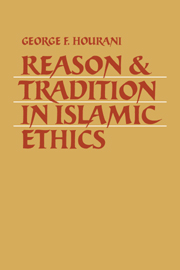Book contents
- Frontmatter
- Contents
- Preface
- Foreword by Michael Marmura
- Conventions
- Titles and locations of the original articles
- Introduction
- 1 Islamic theology and Muslim philosophy
- 2 Ethics in classical Islam: a conspectus
- 3 Ethical presuppositions of the Qurʾān
- 4 ‘Injuring oneself’ in the Qurʾān, in the light of Aristotle
- 5 Two theories of value in early Islam
- 6 Islamic and non-Islamic origin of Muʿtazilite ethical rationalism
- 7 The rationalist ethics of ʿAbd al-Jabbār
- 8 Deliberation in Aristotle and ʿAbd al-Jabbār
- 9 Ashʿarī
- 10 Juwaynī's criticisms of Muʿtazilite ethics
- 11 Ghazālī on the ethics of action
- 12 Reason and revelation in Ibn Ḥazm's ethical thought
- 13 The basis of authority of consensus in Sunnite Islam
- 14 Ibn Sīnā's ‘Essay on the secret of destiny’
- 15 Averroes on good and evil
- 16 Combinations of reason and tradition in Islamic ethics
- Select bibliography
- Index
11 - Ghazālī on the ethics of action
Published online by Cambridge University Press: 13 October 2009
- Frontmatter
- Contents
- Preface
- Foreword by Michael Marmura
- Conventions
- Titles and locations of the original articles
- Introduction
- 1 Islamic theology and Muslim philosophy
- 2 Ethics in classical Islam: a conspectus
- 3 Ethical presuppositions of the Qurʾān
- 4 ‘Injuring oneself’ in the Qurʾān, in the light of Aristotle
- 5 Two theories of value in early Islam
- 6 Islamic and non-Islamic origin of Muʿtazilite ethical rationalism
- 7 The rationalist ethics of ʿAbd al-Jabbār
- 8 Deliberation in Aristotle and ʿAbd al-Jabbār
- 9 Ashʿarī
- 10 Juwaynī's criticisms of Muʿtazilite ethics
- 11 Ghazālī on the ethics of action
- 12 Reason and revelation in Ibn Ḥazm's ethical thought
- 13 The basis of authority of consensus in Sunnite Islam
- 14 Ibn Sīnā's ‘Essay on the secret of destiny’
- 15 Averroes on good and evil
- 16 Combinations of reason and tradition in Islamic ethics
- Select bibliography
- Index
Summary
With all the breadth of his interests as a theologian, jurist, logician, educator, Ṣūfī, critic of philosophy and foe of Ismaʿilism, Ghazālī's central concern throughout his life (a.d. 1058–1111) may fairly be described as an ethical one: right conduct and the purification of the soul by the individual, as means to a harmonious relation with God and the attainment of everlasting joy. This is of course a religious view of ethics, and one believed to have been learned from God through prophetic revelation and associated divine sources accepted in classical Islam.
The present study will not attempt to treat the entire system of his ethics in its prolific details. We shall be concerned with some of its general aspects. We shall also limit the study to the sphere of conduct, and not deal with the sphere of character and improvement of the soul, important as that subject is in Ghazālī's total ethics.
In order to explain more precisely the object of study and its place in the system as a whole, it will be useful to begin with a summary account of three relevant religious sciences as Ghazālī conceived them: theology (ʿilm al-kalām), ‘law’ (ʿilm al-fiqh) and ethics of character (ʿilm al-akhlāq).
Kalām is defined by Ghazālī simply as the study of God, and it has four principal topics: the existence and fundamental nature of God, His attributes, His actions, and His prophets and revelation.
- Type
- Chapter
- Information
- Reason and Tradition in Islamic Ethics , pp. 135 - 166Publisher: Cambridge University PressPrint publication year: 1985

